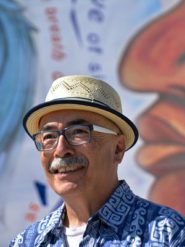Juan Felipe Herrera, Author

Juan Felipe Unity Poem Fiesta
Juan Felipe Herrera is the author of several poetry collections, short stories, young adult literature, and children’s books. Among many of his works are the recent Notes on the Assemblage, Half of the World in Light: New and Selected Poems, and The Upside Down Boy. He became the US poet laureate in 2015 for two years. His poems advocate for harmony and freedom in today’s ever diversifying world. His poetry particularly speaks to the working class, migrant workers, and the civil rights activists.
Among his many interests are photography, theatre, and performance poetry. He is also a performance poet and teaches performance within the community. He has created several performance ensembles.
He has taught at the Iowa Writer’s Workshop and has worked as chair of CSU Fresno’s Chicano and Latin American studies department. In the past, he has also served as Chancellor of the Academy of American Poets.
I interviewed Juan Felipe Herrera via phone on March 4, 2018.
Jennifer Mahoney: During your seminar at Antioch University in December 2017, you mentioned that a poem is “a mobile, a hanging architectural structure.” Will you tell me more about this?
Juan Felipe Herrera: The reader, all those things give the poem a new look, a motion in a way—how it moves and what it is for each reader, for each culture and place and time. If you look at it objectively, it’s a little structure. For me, I highly enjoy assembling the poem, building lines, moving words, creating spaces and pauses. It’s a structure, definitely. And I enjoy that quite a bit. The more mobile and the more fluid a poem is for me, the better, even though there is an architectural layer to it.
It’s connected to the notion of freedom of thought. And that’s a big thing right now, having freedom of thought. One group’s version of what is going on with another group’s version of what is going on, and if you don’t agree with the extreme right way of thinking then you are a free thinker.
JM: You’ve spoken about new coalitions, new symbols, refreshing symbols to nourish and expand the new Civil Rights movement. In what ways do you think writers, specifically, should rethink this movement?
JFH: We are going through such tremendous and intense changes. New symbol—the male symbol and the female symbol—those have been around for quite a while. It’s like art. Each new movement comes up with a whole new description of what is going on, for itself and what art is. So I think that’s something that is very high on the priority list, people interested in social change. We really do need to come up with a new sort of idea agreement—where we’re going and what we want and how we want it to be done, in what shape it’s going to be in. And how do we come together as diverse people and groups? And even if that is important at all. So we really have to kind of loosen our thoughts quite a bit and our historical narrative of thinking. Give ourselves a number of moments to imagine what is going on now and how we want to present ourselves. That’s where symbols come in. How we want to present ourselves globally and locally.
JM: In your piece, “Let Me Tell You What A Poem Brings,” the speaker mentions that a poem “is a way to attain a life without boundaries.” What ways does the poem break boundaries.
JFH: It’s kind of connected to the haiku in a way. The haiku, one of its great possibilities is that there is something literally and also something very deep in a haiku where you have to spring out of it and find something boundless. So that’s what I’m thinking about. That poem is boundlessness. Kind of like a number of days in your life where a particular day you have a very large expansive insight that you have never had before. It kind of comes out of nowhere, and it’s very big. And that’s what I’m kind of looking at…One day you actually crawl into this thing that you talked about whether it was freedom or love or unity. You really imagine it and you really feel it and you walk up to it as opposed to just saying it.
JM: You’ve spoken about Frederick Douglass at previous lectures. He is one of the many figures who inspire your work. He wanted to promote a new society. How might Frederick Douglass’s idea of freedom apply to the current situation in this country?
JFH: It’s connected to the notion of freedom of thought. And that’s a big thing right now, having freedom of thought.
One group’s version of what is going on with another group’s version of what is going on, and if you don’t agree with the extreme right way of thinking then you are a free thinker.
One of the worst things that can happen to us is be disconnected from each other. And to top it off, to be comfortable being disconnected—that’s even worse. So unity. It’s kind of intimate unity.
At large, I keep on thinking of the old school term that Milosz also used in the 40s when he speaks of Hitlerism and Stalinism. He mentioned very appropriately the term mass hypnosis. And people were being forced to learn a particular way of thinking…and if you didn’t follow, you were shot, banished, exiled. And Milosz was also interested in freedom of thought. So he mentioned the term mass hypnosis…from early psychoanalytic narratives of the early 20th century. And I think that’s what’s kind of going on all of a sudden too. Douglass was also concerned about freedom of thought because as a slave, with slavery, they were not allowed to read, not allowed to have books or mentors or teachers, not to talk about the world of writing or thinking or reading or speeches. So that was highly sanctioned. They were brutally punished because they wanted to read or follow the book. I found that to be alarming, of course, but I also found it to be alarming related to today. We’re kind of surface thinkers many a time. We just kind of read a little bit about this, a little bit about that. Or we’re just interested in the general news or we’re just interested in the movies—a cultural surface layer. We all have a good time. We go to Starbucks, we go to the movies, we come home, we talk, have a nice conversation. But it’s hard to take time out to really deepen our thinking of what on earth is going on right now. So freedom of thought, freedom of thinking is very critical.
JM: Speaking of media, because we are at a time where we need to be thoughtful, how can we practice thoughtfulness in today’s busy society with our everyday technology holding our attention?
Unity is a sweet word, but it’s quite a challenge. That’s my number one issue, how to have a new kind of unity, not this kind of unity where everybody is separate, cut off from each other. That’s not unity.
JFH: We have to stop. Corporate media has become highly, highly developed. I think about the Disney cartoons back in the 50s. They were like rudimentary compared to Disney cartoons today. The same is true to the advertisements today versus ten years ago. But corporate systems have built up a pretty deep and wide global reach and with extremely sophisticated material. They’re like short films. A commercial is a short film. It’s not just a commercial. It’s actually a dramatic film. So where does that leave you and me. Where do we have time to really think it over? So we have to be aware of that power as overtaking. It’s overtaking our way of being and our way of thinking. So we have to notice it and turn it off or find another path.
JM: You mentioned that what most brings you happiness is unity, to be one with everything and everyone. How can poetry bring readers and writers this fulfillment?
JFH: Poetry, art, meditative people, people who have discussions, teachers, classrooms. It’s going on all over the place. But it’s hard to notice once again, and we’re not in those classrooms. I remember seeing an experiment with animals, they show things here and there on tv. And this was a cat, abandoned. And all it had was a social relationship with a small piece of wood with a rug attached to it. What the cat ended up doing was rubbing itself against that carpet because it felt like it had a partner. Self-intimacy. One of the worst things that can happen to us is be disconnected from each other. And to top it off, to be comfortable being disconnected—that’s even worse. So unity. It’s kind of intimate unity. Not just kind of mechanical unity where we’re all in a theatre. I don’t know if there is unity there. We have to find out what unity is. We have to rediscover it. Groups being banned. Groups being deported. Sexual assault being ignored. Women’s experiences being ignored. High school students being massacred. And two or three days later, it’s off the agenda.
So unity is a sweet word, but it’s quite a challenge. That’s my number one issue, how to have a new kind of unity, not this kind of unity where everybody is separate, cut off from each other. That’s not unity. So that’s a good thing. And that does bring me happiness when I come together with friends and family.
JM: Do you think it is important for writers to listen to and have conversations with many people? If so, how has this idea contributed to your own writing?
JFH: We really are nourished by being in a pact of artists and people. At the heart of writing, for particularly poets, it’s going to be hard to notice your poetry if you just go at it by yourself. You select your own book that you want to read, and you write your own way, and you think it all out yourself in your bright poetry head. But poetry is a communal art…Being in a group of writers and poets and doing things together, and talking and going out, walking down the street and organizing events, going across country, and going to another nation together, and traveling around—one is more on the wilder traveling, anything goes world, meeting people. And the other side is kind of the writing world where you write. You may be on your own, mostly, but you will have heard people so you think differently than you do. You will have discovered new words that you know but you never thought of using them in that particular way. And you’ve just been inspired by having someone right next to you, and that itself gave you a whole lot of new energy or you work with a group of writers, and you say, ‘Hey, let’s do a poetry reading called the green elephants.’ And it’s completely amazing to you and you see people come. People applaud you or they give you feedback. You pass out your free poems. And that keeps you going as a writer, and it keeps you expanding as a writer, instead of just being the same way week after week. So, for a poet, poetry is a communal art, mostly.

 Jennifer Mahoney is a Filipino writer in Houston. She is a graduate student at Antioch University where she studies poetry and fiction. She currently serves as an editor for Lunch Ticket. She has upcoming poetry in The Machinery.
Jennifer Mahoney is a Filipino writer in Houston. She is a graduate student at Antioch University where she studies poetry and fiction. She currently serves as an editor for Lunch Ticket. She has upcoming poetry in The Machinery.


